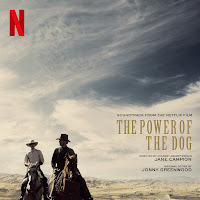Music composed by Jonny Greenwood
Album running time: 40 minutes
Available on Lakeshore Records
 Known for his work with the band Radiohead, Greenwood burst onto the film scene with There Will Be Blood (2007). Most of his film work are his collaborations with director Paul Thomas Anderson including Phantom Thread (2017), where Greenwood received an Oscar nomination. Greenwood has gotten critical attention from his 2021 work: Spencer, Anderson's latest Licorice Pizza and The Power of the Dog.
Known for his work with the band Radiohead, Greenwood burst onto the film scene with There Will Be Blood (2007). Most of his film work are his collaborations with director Paul Thomas Anderson including Phantom Thread (2017), where Greenwood received an Oscar nomination. Greenwood has gotten critical attention from his 2021 work: Spencer, Anderson's latest Licorice Pizza and The Power of the Dog.
Available on Lakeshore Records
 Known for his work with the band Radiohead, Greenwood burst onto the film scene with There Will Be Blood (2007). Most of his film work are his collaborations with director Paul Thomas Anderson including Phantom Thread (2017), where Greenwood received an Oscar nomination. Greenwood has gotten critical attention from his 2021 work: Spencer, Anderson's latest Licorice Pizza and The Power of the Dog.
Known for his work with the band Radiohead, Greenwood burst onto the film scene with There Will Be Blood (2007). Most of his film work are his collaborations with director Paul Thomas Anderson including Phantom Thread (2017), where Greenwood received an Oscar nomination. Greenwood has gotten critical attention from his 2021 work: Spencer, Anderson's latest Licorice Pizza and The Power of the Dog. As we meet the characters in 1920s Montana, the album begins with 25 Years. We hear the Western influences with a cello plucked like a banjo. The bowed strings have sharp entrances, adding harmony and moments of dissonance. Requiem for Phil begins with a forceful horn solo with vibrato-less strings staying underneath.
So Soft is a warmer string piece, with an uneven sense of harmonic changes and disjointed bow uses. Greenwood explored the sound of a computer operated pianola and we hear the frantic sounds in Detuned Mechanical Piano. In Prelude we hear repeating patterns on strummed and bowed cello ending with a flourish like the Bach Cello Suite. The Ravine brings the high registered horns with noticeable reverb which represents the mountainous landscape.
The violin solo in Mimicry is full of blurry string crossings and double stops. West Alone gives us the film's main theme - first represented with a piano solo, later joined by viola. It features a lyrical sound with a more distinct chord structure. Miss Nancy Arrives features the banjo-plucked cello and propulsive bowed cellos - representing Phil's mocking of Peter. Figured It Out features the same style heard in the first track backed by blended strings.
Viola Quartet is a lovely piece, with plenty of minimalist elements, rolling string crossings and discordant moments somehow ending in unison. The echoing horns calls return in Best Friends with murmuring strings, giving a mysterious and unsettling feel. Paper Flowers brings the detuned piano back representing Rose's fall into madness. A Lovely Evening has the string ensemble with overlapping statements, like a close echo.
They Were Mine has rapid repeating notes in the strings, giving the piece momentum. In West, Greenwood returns to the main theme on strings. Psalm 22 (mistakenly left off the digital release for a few days) is the longest cue on the album. Another piece for string ensemble, it blurs between major and minor keys. It eventually adds a cascading piano pattern into a dreamlike atmosphere as the album ends.
Much of Greenwood's goal was to make a score that didn't interact with specific characters. Instead, he tended to score the underlying tone and emotions of the characters - specifically the nasty Phil and how his behavior shaped his brother George and ultimately Rose and her son Peter. The film and the score doesn't give the audience the typical Western feel or much emotion to latch on to - both of those aspects were done on purpose. Instead, we hear lots of Greenwood's musical influences combined together.
Due to the pandemic, many parts are performed by Greenwood himself and the smallest ensemble, giving it that intimate chamber feel. The score does blend into the film's tone, but thinking back, the most memorable music in the film is the piano and banjo match of Radetsky March by Strauss. Like Greenwood's past scores, the album isn't the easiest to listen to, but it's fascinating to hear his "experimental" film scoring ideas.




0 Comments